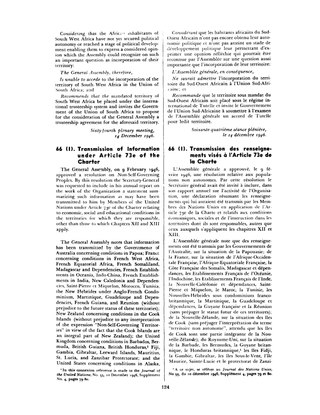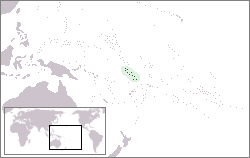
The member states of the United Nations comprise 193 sovereign states. The United Nations (UN) is the world's largest intergovernmental organization. All members have equal representation in the UN General Assembly.
A United Nations General Assembly resolution is a decision or declaration voted on by all member states of the United Nations in the General Assembly.
China is one of the members of the United Nations and is one of five permanent members of its Security Council. One of the victorious Allies of World War II, the Republic of China (ROC) joined the UN as one of its founding member countries in 1945. The subsequent resumption of the Chinese Civil War between the government of Republic of China and the rebel forces of the Chinese Communist Party, led to the latter's victory on the mainland and the establishment of the People's Republic of China (PRC) in 1949. Nearly all of mainland China was soon under its control and the ROC government retreated to the island of Taiwan.

The Russian Federation continued to use the Soviet Union's seat, including its permanent membership on the Security Council in the United Nations after the 1991 dissolution of the Soviet Union, which originally co-founded the UN in 1945. The continuity was supported by the USSR's former members and was not objected to by the UN membership; Russia accounted for more than 75% of the Soviet Union's economy, the majority of its population and 75% of its land mass; in addition, the history of the Soviet Union began in Russia with the October Revolution in 1917 in Petrograd. If there was to be a continuator to the Soviet seat on the Security Council among the former Soviet republics, these factors made Russia seem a logical choice.

The United Nations Security Council veto power is the power of the five permanent members of the UN Security Council to veto any decision other than a "procedural" decision.

Chapter XI of the United Nations Charter defines a non-self-governing territory (NSGT) as a territory "whose people have not yet attained a full measure of self-government". Chapter XI of the UN Charter also includes a "Declaration on Non-Self-Governing Territories" that the interests of the occupants of dependent territories are paramount and requires member states of the United Nations in control of such territories to submit annual information reports concerning the development of those territories. Since 1946, the UNGA has maintained a list of non-self governing territories under member states' control. Since its inception, dozens of territories have been removed from the list, typically when they attained independence or internal self-government, while other territories have been added as new administering countries joined the United Nations or the UN General Assembly (UNGA) reassessed their status.

United Nations Security Council resolution 1244, adopted on 10 June 1999, after recalling resolutions 1160 (1998), 1199 (1998), 1203 (1998) and 1239 (1999), authorised an international civil and military presence in the Federal Republic of Yugoslavia and established the United Nations Interim Administration Mission in Kosovo (UNMIK). It followed an agreement by Yugoslav President Slobodan Milošević to terms proposed by President of Finland Martti Ahtisaari and former Prime Minister of Russia Viktor Chernomyrdin on 8 June, involving withdrawal of all Yugoslav state forces from Kosovo.
The political status of Kosovo, also known as the Kosovo question, is the subject of a long-running political and territorial dispute between the Serbian government and the Government of Kosovo, stemming from the breakup of Yugoslavia (1991–92) and the ensuing Kosovo War (1998–99). In 1999, the administration of the Autonomous Province of Kosovo and Metohija was handed on an interim basis to the United Nations under the terms of UNSCR 1244 which ended the Kosovo conflict of that year. That resolution reaffirmed the territorial integrity of Serbia over Kosovo but required the UN administration to promote the establishment of 'substantial autonomy and self-government' for Kosovo pending a 'final settlement' for negotiation between the parties.

The Act of the Re-Establishment of the State of Lithuania or Act of 11 March was an independence declaration by Lithuania adopted on 11 March 1990, signed by all members of the Supreme Council of the Republic of Lithuania led by Sąjūdis. The act emphasized restoration and legal continuity of the interwar-period Lithuania, which was occupied by the Soviet Union and annexed in June 1940. In March 1990, it was the first of the 15 Soviet republics to declare independence, with the rest following to continue for 21 months, concluding with Kazakhstan's independence in 1991. These events led to the dissolution of the Soviet Union in December 1991.

United Nations Security Council Resolution 69 was adopted on 4 March 1949. Having received and considered Israel's application for membership in the United Nations, the Security Council decided that in its judgement Israel was a peace-loving state and was able and willing to carry out the obligations contained in the Charter and it therefore recommended to the General Assembly that it grant membership to Israel.

The three Baltic countries, or the Baltic states – Estonia, Latvia, and Lithuania – are held to have continued as independent states under international law while under Soviet occupation from 1940 to 1991, as well as during the German occupation in 1941–1944/1945. The prevailing opinion accepts the Baltic thesis that the Soviet occupation was illegal, and all actions of the Soviet Union related to the occupation are regarded as contrary to international law in general and to the bilateral treaties between the USSR and the three Baltic countries in particular.

United Nations Security Council resolution 652, adopted unanimously on 17 April 1990, after examining the application of the Republic of Namibia for membership in the United Nations, the Council recommended to the General Assembly that Namibia be admitted.

United Nations Security Council resolution 704, adopted without a vote on 9 August 1991, after examining the application of the Marshall Islands for membership in the United Nations, the Council recommended to the General Assembly that the Marshall Islands be admitted.

United Nations Security Council resolution 1290 was adopted on 17 February 2000. Resolution 1290 examined Tuvalu's application to become the 189th member of the United Nations (UN). Tuvalu achieved independence in 1978 after over eighty years of British colonial rule. The country had struggled economically, and it took the 2000 sale of Tuvalu's Internet country code top-level domain .tv for the nation to be able to afford UN membership. Resolution 1290 was adopted unopposed, although China abstained due to concerns over Tuvalu's relationship with Taiwan.

The permanent members of the United Nations Security Council are the five sovereign states to whom the UN Charter of 1945 grants a permanent seat on the UN Security Council: China, France, Russia, United Kingdom, and United States.

The Republic of Korea and the Democratic People's Republic of Korea were simultaneously admitted to the United Nations (UN) in 1991. On 8 August 1991, the UN Security Council passed Resolution 702, recommending both states to the General Assembly for membership. On 17 September 1991, the General Assembly admitted both countries under Resolution 46/1.
Serbia joined the United Nations on November 1, 2000, as the Federal Republic of Yugoslavia. The previous Yugoslav state was one of the original 51 member states of the United Nations.

Democratic Federal Yugoslavia was a charter member of the United Nations from its establishment in 1945 as the Socialist Federal Republic of Yugoslavia until 1992 during the Yugoslav Wars. During its existence the country played a prominent role in the promotion of multilateralism and narrowing of the Cold War divisions in which various UN bodies were perceived as important vehicles. Yugoslavia was elected a non-permanent member of the United Nations Security Council on multiple occasions in periods between 1950 and 1951, 1956, 1972–1973, and 1988–1989, which was in total 7 years of Yugoslav membership in the organization. The country was also one of 17 original members of the Special Committee on Decolonization.
Ukraine was one of the founding members of the United Nations when it joined in 1945 as the Ukrainian Soviet Socialist Republic; along with the Byelorussian Soviet Socialist Republic, Ukraine signed the United Nations Charter when it was part of the Soviet Union. After the dissolution of the Soviet Union in 1991, the newly independent Ukraine retained its seat.
Azerbaijan has been a member in the United Nations since March 2, 1992, after the UN General Assembly admitted Azerbaijan at its 46th session. The Permanent Mission of the Republic of Azerbaijan was opened in New York City in May 1992. On October 29, 1991, soon after gaining independence from the Soviet Union, Azerbaijan applied to the UN General Assembly for joining the organization. Azerbaijan was elected as a non-permanent member of the UN Security Council for the term of 2012–2013.














